九年级英语上册unit5unit5 look into science课堂练习一新版冀教版
- 格式:doc
- 大小:120.00 KB
- 文档页数:3
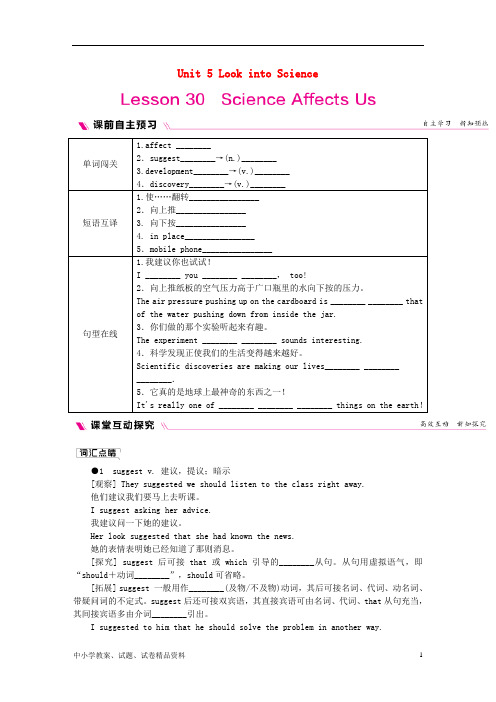
Unit 5 Look into Science●1 suggest v. 建议,提议;暗示[观察] They suggested we should listen to the class right away.他们建议我们要马上去听课。
I suggest asking her advice.我建议问一下她的建议。
Her look suggested that she had known the news.她的表情表明她已经知道了那则消息。
[探究] suggest 后可接that 或which引导的________从句。
从句用虚拟语气,即“should+动词________”,should可省略。
[拓展] suggest 一般用作________(及物/不及物)动词,其后可接名词、代词、动名词、带疑问词的不定式。
suggest后还可接双宾语,其直接宾语可由名词、代词、that从句充当,其间接宾语多由介词________引出。
I suggested to him that he should solve the problem in another way.我建议他用另一种方式解决这个问题。
[辨析] suggest与advise1.(1)我建议用一种不同的方法做这件事。
I ________ ________ it in a different way.(2)我建议班会不要在星期六举行。
I ________ ________ the class meeting should not be held on Saturday.(3)2017·滨州—What a good________ you've given me! Thanks a lot.—My pleasure.A.informationB.newsC.suggestionD.advice●2 development n. 发展[观察] What are your plans for the development of your company?你打算怎样来发展你的公司?[拓展] (1)development的动词形式是develop,意为“发展;壮大”。
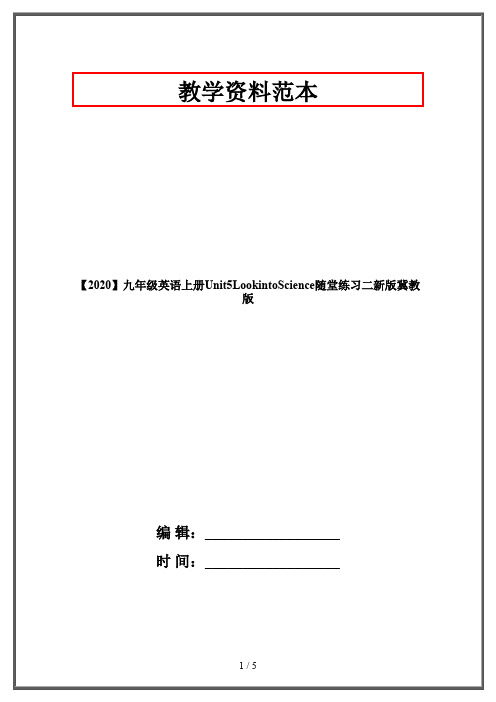
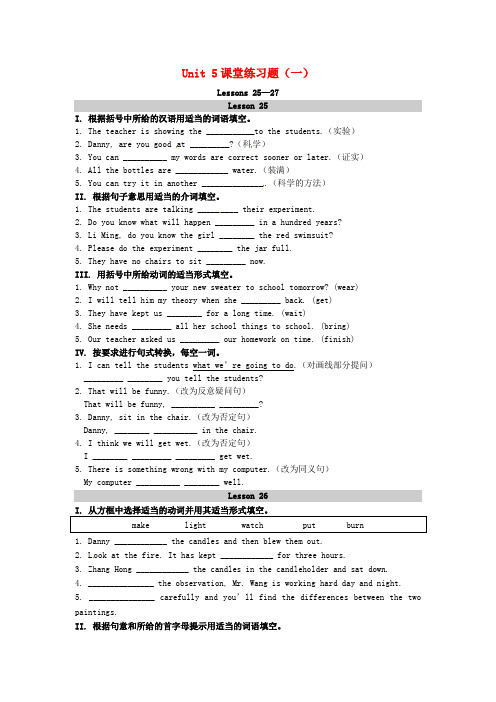
Unit 5课堂练习题(一)Lessons 25—27Lesson 25I. 根据括号中所给的汉语用适当的词语填空。
1. The teacher is showing the ___________to the students.(实验)2. Danny, are you good at _________?(科学)3. You can __________ my words are correct sooner or later.(证实)4. All the bottles are ____________ water.(装满)5. You can try it in another ______________.(科学的方法)II. 根据句子意思用适当的介词填空。
1. The students are talking _________ their experiment.2. Do you know what will happen _________ in a hundred years?3. Li Ming, do you know the girl ________ the red swimsuit?4. Please do the experiment ________ the jar full.5. They have no chairs to sit _________ now.III. 用括号中所给动词的适当形式填空。
1. Why not __________ your new sweater to school tomorrow? (wear)2. I will tell him my theory when she _________ back. (get)3. They have kept us ________ for a long time. (wait)4. She needs _________ all her school things to school. (bring)5. Our teacher asked us _________ our homework on time. (finish)IV. 按要求进行句式转换,每空一词。
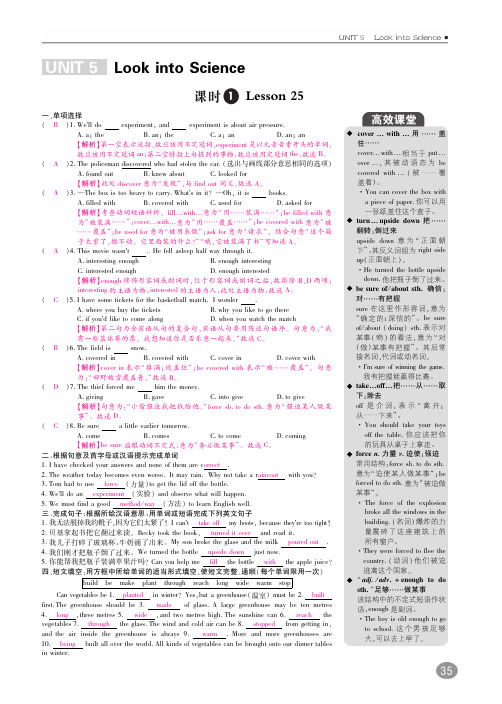
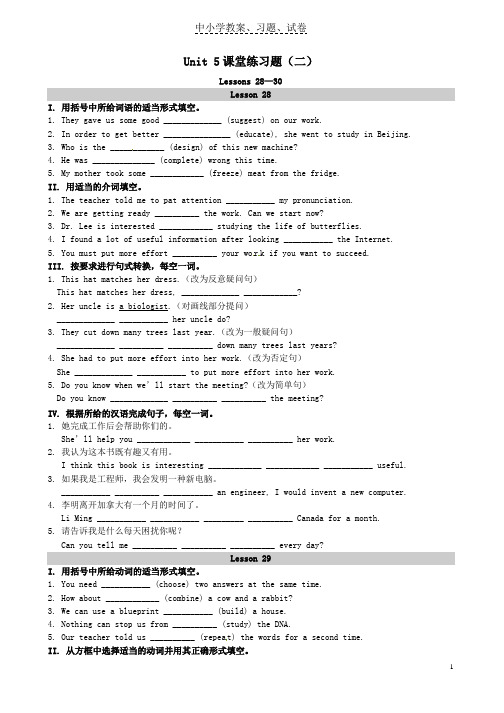
Unit 5课堂练习题(二)Lessons 28—30Lesson 28I. 用括号中所给词语的适当形式填空。
1. They gave us some good _____________ (suggest) on our work.2. In order to get better _______________ (educate), she went to study in Beijing.3. Who is the ____________ (design) of this new machine?4. He was ______________ (complete) wrong this time.5. My mother took some ____________ (freeze) meat from the fridge.II. 用适当的介词填空。
1. The teacher told me to pat attention ___________ my pronunciation.2. We are getting ready __________ the work. Can we start now?3. Dr. Lee is interested ____________ studying the life of butterflies.4. I found a lot of useful information after looking ___________ the Internet.5. You must put more effort __________ your wo r k if you want to succeed.III. 按要求进行句式转换,每空一词。
1. This hat matches her dress.(改为反意疑问句)This hat matches her dress, _____________ ____________?2. Her uncle is a biologist.(对画线部分提问)_____________ ___________ her uncle do?3. They cut down many trees last year.(改为一般疑问句)_____________ __________ __________ down many trees last years?4. She had to put more effort into her work.(改为否定句)She _____________ ___________ to put more effort into her work.5. Do you know when we’ll start the meeting?(改为简单句)Do you know _____________ __________ __________ the meeting?IV. 根据所给的汉语完成句子,每空一词。
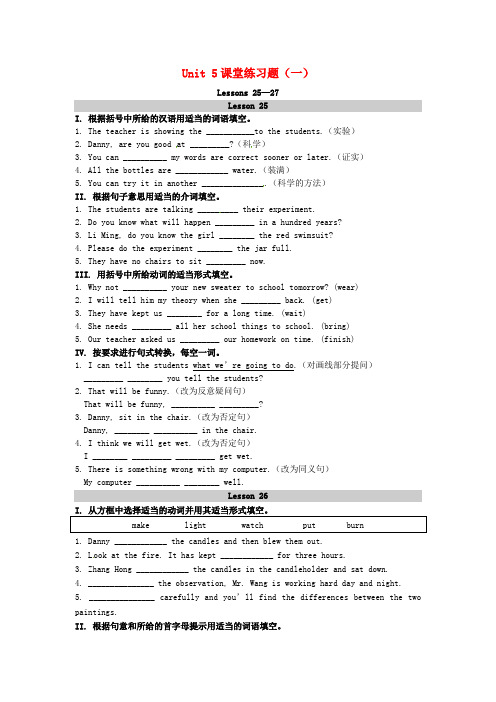
Unit 5课堂练习题(一)Lessons 25—27Lesson 25I. 根据括号中所给的汉语用适当的词语填空。
1. The teacher is showing the ___________to the students.(实验)2. Danny, are you good at _________?(科学)3. You can __________ my words are correct sooner or later.(证实)4. All the bottles are ____________ water.(装满)5. You can try it in another ______________.(科学的方法)II. 根据句子意思用适当的介词填空。
1. The students are talking _________ their experiment.2. Do you know what will happen _________ in a hundred years?3. Li Ming, do you know the girl ________ the red swimsuit?4. Please do the experiment ________ the jar full.5. They have no chairs to sit _________ now.III. 用括号中所给动词的适当形式填空。
1. Why not __________ your new sweater to school tomorrow? (wear)2. I will tell him my theory when she _________ back. (get)3. They have kept us ________ for a long time. (wait)4. She needs _________ all her school things to school. (bring)5. Our teacher asked us _________ our homework on time. (finish)IV. 按要求进行句式转换,每空一词。
Lesson 30Science Affects UsⅡ.词汇练习(A)用方框中所给单词或短语的适当形式填空。
surprise, sound, mobile phone, affect, discover 1.The story you told us____________ interesting.2.What you do will____________ your child.3.Your appearance really makes me ____________.4.He ____________ how to start that machine just now.5.More and more people can't live without their ____________.(B)用所给单词的适当形式填空。
1. He ran into the room and __________(surprise) everyone.2.Let's wait and see what __________(happen) next.3.Scientific________ (discover) are making our lives easier and more comfortable.4.Thank you for giving us so many good ________ (suggest).5.I was amazed at the rapid ________ (develop) of my hometown.Ⅲ.单项填空()1.The Yangtze River is one of ________ in the world.A.the longest riversB.the longest riverC.longer riversD.longer river()2.My teacher suggested that we________ our homework on time.A.to finish B.finishingC.finish D.finished()3.It's a good habit to put everything ________ place.A.in B.at C.for D.with()4.Look out! The cup is ________ hot water.A.fill with B.full ofC.full D.filled()5.The machine will start to work when you ________ the red button(按钮).A.push down B.put upC.take off D.look down()6.The man ________ talked to you is our maths teacher.A.that B.which C.what D.when()7.The price of the tomatoes this year is higher than ________ of last year.A.it B.that C.those D.the()8.The rapid ________ of our country makes all of us feel proud.A.choice B.developmentC.door D.futureⅣ.句型练习(A)连词成句。
Unit 5 Look into Science!单词练习根据括号中所给汉语用适当的词语填空。
1. How about ____________(改正)your deeds at once?2. They ___________(强迫)us to go with them, but I refused.3. Your dress ____________(相配)your boots very well.4. Helen _____________(检查)her computer and then turned it on.5. I won’t believe this matter ___________ (除非)I see it with my own eyes.6. This word has _______________(双的)letters. Have you found them?7. Look! How _____________(了不起的)those animals are! They can climb up very high.8. We should use fewer _____________(化学制品)in our everyday life.9. We don’t need any ____________(复制品). Write them by hand.10. Have you noticed those ____________ (发现)? They are helpful to us.短语练习1. What about ___________ the cup ___________a lid at once?2. They _____________ this exam and they are working hard for it now.3. Danny ______________ all his money yesterday and he borrowed some from me.4. ________________ the library, we went to many other places.5. These stories _______________a great scientist. They are all about the researches of his.单词练习1. correcting2. forced3. matches4. examined5. unless6. double7. fantastic8. chemicals9. copies 10. discoveries短语练习1. covering, with2. are sure of3. used up4. Except for5. are related to。
Unit 5 Look into ScienceLesson 30 Science Affects Us同步练习1. My mother (建议) going for a walk after dinner last weekend.2. Nowadays, every one has their own (移动电话).3. The (发现) of a new planet has been reported on newspaper.4. A happy home environment can (影响) a child.5. The teacher and his students did an (实验) this morning.1. The boy is ____________ (bad) hurt.2. Don’t be ____________ (scary). You will be OK.3.—Are you hurt?—No, I’m not ____________ (injure).1. They often________ experiments in class last month.A. doB. didC. doesD. to do2. He covered the table________ a cloth.A. ofB. withC. atD. in3. I did an interesting experiment and wanted_______ my teacher.A. to surprise atB. to surpriseC. to be surprised atD. surprise4. The air pushes_______ on us_______ above.A. down, fromB. up, fromC. from, downD. from, up5. We shouldn’t go to school_________ breakfast. It’s bad for our health.A.withB. withoutC. forD.by1.他想知道那是什么意思。
Unit5 Look into Science单元练习一、单项选择1. Father won't allow me to play outside Iwash up the dishes.A. if notB. ifC. unlessD. because2. Can you it? I didn't follow you just now.A. repeatB. rememberC. replyD. report3. --- Oh no! What can I do with my computer?--- Press Enter and follow the on-screen(屏幕) .A. collectionB. instructionsC. educationD. questions4. I suggest next week.A. go mountain climbingB. will go mountain climbingC. to go mountain climbingD. going mountain climbing5. This group is of seven men.A. madeB. made upC. help withD. connect with6. the kid has noparents, his grandparents look after him well.A. As though; /B. As though; butC. Even though; /D. Even though; but7. If you the book, you'll find somethingsurprising.A. turn downB. turn onC. turn offD. turn over8. Betty went to the museum and saw manypictures were drawn by a famous person.A. thatB. whoC. whatD. whom9. I'll remember the old buildings Ivisited in the village.A. whereB. whichC. whoD. what10. --- I want to find a partner to practice roller skating.--- My friend Fred is a person may help you a lot.A. whichB. whoseC. whoD. whom二、完形填空Technology has made life much easier for children today. It is 11 for them to play, to listen to music, and to 12 in touch with their friends. 13 the help of technology, there seems to be nothing that childrencan't do now.Technology also helps 14 to know more about their children. For example, if a child is given a mobile phone with a tracking(追踪) device, his parents can find out 15 he is going with the help of the mobile phone.However, there are also some bad 16 of technology. For example,it has become easier for bad people to get in touch with children with the help of technology. They can find personal information about children through special wayson the 17 . So it is very important for parents to 18 their children to keep personal information safe while surfing the Internet.Besides this, there is another bad thing about technology. Children now 19 less time doing exercise than before. They are too 20 playing online games. They can even play computer games all day long. If you don't push themout of the door, they won't volunteer to go out and play. This is not good for their health.Therefore, teaching children the right way to make good use of technologyis very important.11. A. easier B. more difficultC. more importantD. harder12. A. lose B. make C. keep D. contact13. A. For B. Under C. With D. Over14. A. teachers B. friends C. parents D. classmates15. A. when B. whom C. why D. where16. A. sides B. places C. choices D. winds17. A. phone B. TV C. radioD. Internet18. A. teach B. learn C. punish D. lend19. A. pay B. take C. cost D. spend20. A. lazy B. free C. busy D.hard-working三、阅读理解AWhat should you take in with you when you take an exam? Pen, pencil, eraser, ruler…, and don't forget a bottle of water!According to a study at the British Psychological( 心理学的) Society Annual Conference held in London, students who bring water into exams may improve their grades by up to 10 percent.Scientists at the University of East London and the University of Westminster, UK, did a study on 447 students. The students were studying for different degrees(学历) at the University of East London. Only 25 percent of them entered the exam hall with something to drink.Scientists then compared their exam results with their normal schoolwork grades. They found that all those who had brought drinks with them got better grades by between 2 and 10 percent.It is unclear why drinking water improves exam results. But scientists say having enough water in our bodies and not feeling thirsty could have a helpful effecton our brains. Drinking water may also cut down on anxiety(焦虑), which has a bad effect on exam performances, according to Chris Pawson, PhD, of the University of East London."Whatever the explanation, it is clear that students should try hard to stay hydrated(含水的) with water during exams," he said.So next time, when you are going to have a big exam, try bringing a bottle of water with you. Who knows—it may help you pass the exam!21. How much may the students improve their grades most if they bring water into exams?A. By 2%.B. By 8%.C. By 10%.D. By 25%.22. How many students in the study got better grades?A. About 112 students who brought drinks or water into their exams.B. All the 447 students who come from the University of East London.C. About 300 students who took part in the study.D. About 10 percent of the students who studied different subjects.23. The underlined phrase "cut down on" probably means .A. increaseB. bringC. reduceD. change24. According to the passage, how does water help students in exams?a. It is good for their brains.b. It makes students smarter.c. It helps students stay cool.d. It helps students stay awake.A. a bB. a cC. b cD. c d25. Where can you probably read the article?A. Fashion magazine.B. Text book.C. Travel guide.D. Newspaper.BHave you ever rubbed your hands together when they get cold? Why do we do that? We do that for friction. Friction happens when two things that aren't very smooth rub together to make heat energy. The faster you rub two things together, the more friction (and heat) you can make. Let's discover friction!WHAT YOU'LL NEED:● Soap ● Water ● Your hands!WHAT TO DO:①Make sure your hands are dirty.②Rub your hands together until you feel the heat of your hands.③Now, use soap and water to get your hands very slippery(滑的).④Try to make friction happen while your hands are slippery.⑤Please write down what has happened.LET'S TALK!Friction is an energy that happens when two things tub together. When friction happens, it makes heat! When your hands are slippery, they won't make very much friction and your hands won't get so hot.DID YOU KNOW?● Friction happens when you stop your fast running bike.●Ancient people made fires by rubbing two pieces of wood together. Friction happened though they didn't know it.Friction is everywhere. Have you ever noticed situations where friction is happening? If not, ask your parents to take you out in a car. If it is not hot, touch the tires(轮胎) of the car before and after a short drive to see how much warmer they get from friction.26. This text is most probably .A. a science reportB. a car advertisementC. a rubbing introductionD. a chemistry programme27. You'd better make your hands to get heat when you rub them.A. slipperyB. dryC. wetD. smooth28. What does the word "friction" in this text mean in Chinese?A. 摩擦B. 冷却C. 膨胀D. 震动29. is not an example of friction.A. Bike ridingB. Car drivingC. Hands rubbingD. Friction discovering30. What's the last column(栏目)?A. THINK IT OVER!B. WHAT HAPPENED?C. EVERYDAY ACTIOND. WORK WITH PARENTSCWe often praise the world of science.It explains the world and makes our lives easier with technology. One of the most exciting fields in science is artificial intelligence (人工智能,AI). This is an area where scientists are working on creating machines that think like humans. However, one of the most famous scientists has a very dark warning for us about this type of technology."The development of full artificial intelligence could spell the end of the human race," said Professor Stephen Hawking to the BBC.Hawking is a well-known British physicist and author of bestselling science book A Brief History of Time.This warning came after commenting(评论) the technology he uses to speak with. As Hawking has got a serious disease called ALS, he needs an AI computer to communicate. The computer learns how Hawking thinks and suggests the words he may want to use next.This is a basic type of AI, which is very useful, yet Hawking fears the possibility of creating technology that can match or surpass human intelligence. And it's easy to imagine how terrible things may be. Many TV shows and films show big, killer machines that are far cleverer than us. "Humans, who are limited(限制) by slow biological evolution(进化), couldn't compete," said Hawking.But not every scientist is pessimistic(悲观的) about AI technology. "I believe we will be in control of the technology for a long time," said Rollo Carpenter, creator of Cleverbot in the UK, which is a software program that remembers past conversations, "The advantages of it to solve many of the world problems will be realized."In what direction do you think AI is heading? Should we be hopeful or fearful?31. Which of the following is TRUE about AI?A. It makes our lives easier.B. The technology is not very popular now.C. Scientists haven't controlled the technology.32. The writer took Hawking as an example to .A. explain how AI has helped usB. show AI has already become part of our lifeC. suggest that AI might become dangerous for humans33. What does the underlined word "surpass" mean in the passage?A. 象征B. 促进C. 超越34. We can know from the last paragraph that .A. Rollo agrees with HawkingB. Rollo is a British creatorC. Rollo invented Cleverbot in the US35. Which of the following can be a suitable title for this article?A. AI: A Friend or an EnemyB. The Future of Human BeingsC. The Fight Between Humans and AIDDNA is the whole "map" of the human body. It is something that all humans have, and it tells the body what to do. DNA is the reason that we look like our parents, because we get some of their DNA to make our own.People have been trying to understand the human body for a long time. In I860, Mr Mendel discovered why we look the same as other people in our family. It is because of small things called "genes"(基因) in our body. In 1953, two scientists, Watson and Crick, found out that those small parts are really messages. They're written in the DNA with a special language.In 1961, another two scientists found the first "word" that they could understand in that language. It shows how DNA tells the cell(细胞) to build its parts, the words in the DNA map, but we still do not understand what they all do. By understanding what just one "word" means, we can help to save people from several illnesses. So the more we understand, the more doctors will be able to do.Most people hope that this will help to make better medicine and help sick people: Other people worry that when we can more "words" and find out more information, we will use it in the wrong way, just to make people more attractive(有吸引力的), or stop sick people getting jobs.36. When did Mr Mendel discover why we look the same as other people in our family?A. In 2000.B. In 1961.C. In 1953.D. In 1860.37. What did the two scientists find in 1961? They found .A. all the words in the DNA mapB. small things called "genes" in our bodyC. the first "word" they could understand in that languageD. those small parts arc written in the DNA with a special language38. How can we help sick people if we understand more "words" in the DNA map?A. Make better medicine.B. Make them get jobs.C. Make maps for them.D. Make them attractive.39. Which one is not true according to the article?A. We look like our parents because of "genes" in our body.B. We have understood what all the words in the DNA map do.C. DNA is the whole "map” of the human body.D. DNA tells the cell to build its parts.40. What do people think about this research about DNA?A. It can be only bad.B. It can be only good.C. It can be good but won't work.D. It can be good and bad.四、单词拼写(单句首字母填空)41. “C your mistakes, and you're still a good boy,” Mrs. Li said to Jack.42. There are so many English learning m . You should choose the one that suits you best.43. I'm ten and she is twenty. So her age is d mine.44. --- How was your summer vacation?--- It was f . I had a good time in Beijing.45. The d of Columbus was quite an event in the world.五、单词拼写(根据中文提示拼写单词)46. The ship was helpless against the (力量) of the storm.47. Your white blouse (与……相配) your black trousers very well.48. --- Can I have some cakes?--- (当然可以).49. Mr. Wang has a lovely (孙子).50. He devoted himself to the (发展) of his research.六、翻译(根据中文提示完成句子)51. (一般而言), American families often givea party at home.52. 在日本当你去拜访朋友时,进门之前要脱掉鞋子。
Unit 5课堂练习题(一)Lessons 25—27Lesson 25I. 根据括号中所给的汉语用适当的词语填空。
1. The teacher is showing the ___________to the students.(实验)2. Danny, are you good at _________?(科学)3. You can __________ my words are correct sooner or later.(证实)4. All the bottles are ____________ water.(装满)5. You can try it in another ______________.(科学的方法)II. 根据句子意思用适当的介词填空。
1. The students are talking _________ their experiment.2. Do you know what will happen _________ in a hundred years?3. Li Ming, do you know the girl ________ the red swimsuit?4. Please do the experiment ________ the jar full.5. They have no chairs to sit _________ now.III. 用括号中所给动词的适当形式填空。
1. Why not __________ your new sweater to school tomorrow? (wear)2. I will tell him my theory when she _________ back. (get)3. They have kept us ________ for a long time. (wait)4. She needs _________ all her school things to school. (bring)5. Our teacher asked us _________ our homework on time. (finish)IV. 按要求进行句式转换,每空一词。
1. I can tell the students what we’re going to do.(对画线部分提问)_________ ________ you tell the students?2. That will be funny.(改为反意疑问句)That will be funny, __________ _________?3. Danny, sit in the chair.(改为否定句)Danny, ________ __________ in the chair.4. I think we will get wet.(改为否定句)I ________ _________ _________ get wet.5. There is something wrong with my computer.(改为同义句)My computer __________ ________ well.Lesson 261. Danny ____________ the candles and then blew them out.2. L ook at the fire. It has kept ____________ for three hours.3. Zhang Hong ____________ the candles in the candleholder and sat down.4. _______________ the observation, Mr. Wang is working hard day and night.5. _______________ carefully and you’ll find the differences between the two paintings. II. 根据句意和所给的首字母提示用适当的词语填空。
1. I like science and I think it is very i______________.2. He cut the apple into h__________ and let me choose.3. If I turn off all the lights in the dark. What will h___________?4. Jenny, please fill the bottle f__________ of water.5. We are s____________ you will like this subject.III. 按要求进行句式转换,每空一词。
1. Let her help you with your English.(反意疑问句)Let her help you with your English, __________ _________?2. The candle is pink.(对画线部分提问)__________ __________ is the candle?3. The bag is full of rice.(同义句)The bag is _________ _________ rice.4. She lighted the candle with a match.(一般疑问句)__________ ________ _________ the candle with a match?5. The teacher asked the students what happened.(对画线部分提问)_________ ________ the teacher ask the students?IV. 根据所给的汉语完成下面的句子,每空一词。
1. 我已经用完了所有的水彩笔了。
你能借给我几支吗?I have ____________ ___________ all my markers. Can you lend me some?2. 我们班有五分之三的学生喜欢英语。
______________ ____________ the students in our class like English.3. 李明,不要忘了吹灭蜡烛。
Li Ming, don’t ____________ ____________ ____________ out the candle. 4. 天快黑了,他们便停止工作了。
It was getting dark and they _____________ ____________.5. 让他和你一起做实验吧!____________ ____________ ___________ the experiment with you.Lesson 27I. 根据句意用适当的介词填空。
1. Peter looked ______________ the telescope at the sky.2. The sun will go down _____________ about an hour.3. He looked ____________ his lost bicycle, but he couldn’t find it.4. When did you graduate ____________ this university?5. Mr. Zhou gave me some advice ____________ my English study.II. 按要求进行句式转换,每空一词。
1. They came back home after supper.(对画线部分提问)______________ ___________ _________ __________ back home?2. He said, “I haven’t planned to travel to Sanya.”(改为间接引语)He said ___________ __________ __________ planned to travel to Sanya.3. This is the bicycle. I bought it yesterday.(合并为带有定语从句的复合句) This is the bicycle ____________ __________ ___________ yesterday.4. That is very good advice.(改为感叹句)_____________ ___________ advice that is!5. Her brother enjoyed science at school.(改为否定句)Her brother ____________ __________ science at school.III. 连词成句。
1. worth, try, that, a, is______________________________________________________?2. me, do, be, what, you, to, want______________________________________________________?3. go, once, asked, to, he, home, we______________________________________________________.4. am, excuse, he, making, I, thinks, an______________________________________________________.5. for, been, they, everything have, ready______________________________________________________.IV. 根据所给的汉语完成下面的句子,每空一词。
1. 我姐姐去年毕业于这所大学。
My siste r _____________ _____________ this university last year.2. 自从上周开始我一直在等你。
I _____________ ___________ ___________ for you since last week.3. 你在出去时务必带上雨伞。